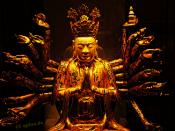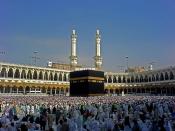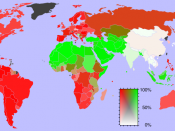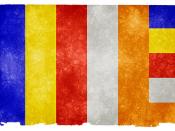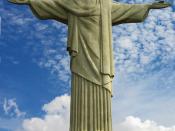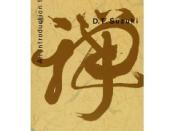Religion is part of everybody's daily life, whether passively or actively. This term, "religion", is used loosely, everywhere in this world. However, its definition is not as simple and straightforward as it appears to be.
Religion is a system of belief, practice and organization which shapes an ethic manifest in the behaviour of its adherents.
Religious beliefs are the interpretation of our surroundings and our personal and immediate experience with reference to the structure of the entire universe, including all dimensions of this.
Belief in supernatural entities is usually emotionally very highly charged; hence the believer imputes special qualities and sacredness to them. This, amongst a variety of other things, is what makes religion so special, so important and so personal to so many people in the world.
Magic is also not easy to define. Perhaps it is best to describe the different types of magic. There is the homeopathic type, which is the belief that an action will have a similar desired effect in a similar context or situation.
Homeopathic magic operates under the law that "like causes like". For example, in folk-magic a "poppet" is a doll used to represent a certain person, enabling the practitioner to cast spells or the like upon said person.
Another type of magic is contagion. This is the belief that a desired effect will be achieved if contact is made between two things or situations. For example, the Awajún, native Peruvians, rub stem cuttings against certain, apparently "fertile" stones, before they plant their trees. This supposedly gives the stem the ability to grow stronger and faster than others, who have not come in contact with these stones.
Magic and religion both involve ritual, symbolism and myth, both deal with supernatural forces and both rely on subjective perception rather than objective perception. Most importantly both have social implications and a purpose for being used.
One very important world religion is Islam. Perhaps the most well known fact about the Islam culture, to non-Muslims, is salat, or ritual prayer. This form of prayer is may be done individually, but carries special merit when practiced with a group of other believers. All over the world, every active Muslim takes part in the salat, five times a day. And all over the world it is directed to the exact location of the Ka'ba shrine in Mecca, the most sacred site of Islam. This is a religious ritual involving symbolism: that of the Ka'ba shrine. However, rituals are not exclusive to religion.
The aborigine tribe are native to Australia and have inhabited and survived there for many thousands of years. A very aspect to their lives is the concept of spirits, magic and rituals. One important ritual aborigines practice is that a karadji, a type of witch doctor, performs to heal. He selectively finds, gathers and subsequently carves a bone. He then pretends to extract it from the patient to "remove the poisoned bone". Obviously fake, but nevertheless very successful, this magical ritual, involving the symbolism of the bone, has survived many centuries and is still in use today.
Magic, essentially, is based on myth. Whatever type or aspect of magic, myth is always present. If stories of successful divination, legends of great necromancers or myths of performed rituals would not exist today; the idea of magic would still be present, yet the ability to perform would have died with the myths.
Myths are also a big part of religion, however not quite as essential as in magic. Almost every big world religion has a sacred text, which not only includes rules with which to live by, but stories of great religious figures, martyrs in fact, and stories of great moral value. Even religions which have been passed on orally usually have many stories which are supposed to enlighten the listener, whether ethically, spiritually or intellectually.
Both religion and magic also focus greatly on supernatural forces. In religion these forces are typically referred to as "god", in magic these forces are used in order to gain benefit.
Supernatural simply means something that can not be proven scientifically. Many religious systems are based solely on this. For example Catholicism is a religion founded on the fact that "God" sent his son, Jesus Christ, down to earth. All of this has not been and can not be scientifically proven; therefore it is a belief in the supernatural.
In modern magic, love spells are often cast. These can be cast with aid of a ritual, with the help of props or simply by chanting a spell. These spells are said to make a certain individual fall in love with the one casting the spell. Obviously there is no proof of the success of these spells, yet they are used often throughout the world, showing great belief in the supernatural.
As previously mentioned, the reason for magic and religion is very often similar, if not the same. Religion is used for guidance, in times of hope or desperation. Magic is used to achieve a goal, to come closer to ones personal satisfaction. These two ideas are more related than appears.
Religion gives many people a purpose in life; it helps them through "rough times" and gives them something to believe in. They want their lives to have meaning; they want something to live for in order to be happy. Using magic focuses more on short term goals of content, but nevertheless it also aims at creating a better situation for the individual. In the end, both magic and religion serve to better and enrich the lives of every practising individual.
Nevertheless there are some differences between religion and magic. Despite the fact that both serve to create a better atmosphere for the individual, religion is based on values and morals, whilst magic is based more upon singular utilitarian acts. Religion requires faith; it requires belief in the religious system. Some magic can be successful without any faith, as long as the tincture is correct and the chant is appropriate, the spell will work.
Religion is a way of life. One can not honestly declare to be Christian one day, Jewish the next and atheist the day following that. If one calls oneself a Zen-Buddhist, one follows (or should follow) the eightfold path to enlightenment, to attain the Buddhist meaning of life; escaping the cycle of rebirth. Buddhists follow this path in every aspect of their lives, refusing to drink alcohol, meditating frequently etc. To Buddhists, this way of life helps them go through every day situations. It gives them hope in becoming better people to satisfy their needs, along with the needs of the surrounding world to create a better environment.
Magic, on the other hand, can appear anytime to anybody that desires a certain effect. For example, if I, an atheist, find a picture of my (dead) father and become acquainted with somebody who could explain the traditions of Macumba to me; I could communicate with my father if I correctly followed the Macumban rules of magic. If I were hoping to communicate with my father and the séance would have been successful (which it should have been), I would have satisfied my desire in the short-term.
This leads us back to the main, essential and crucial difference between magic and religion. Magic can temporarily satisfy your needs, by exploiting opportunistic situations. However, to achieve spiritual equilibrium, profound, long-term happiness and discover the meaning of ones own life, one must turn to religion.
Differences are scarce compared to the many similarities, yet the one all-important difference overrides the quantitative importance of the similarity. To find true meaning in life, one can not turn to magic.
Introduction to Zen Buddhism- D.T. Suzuki

